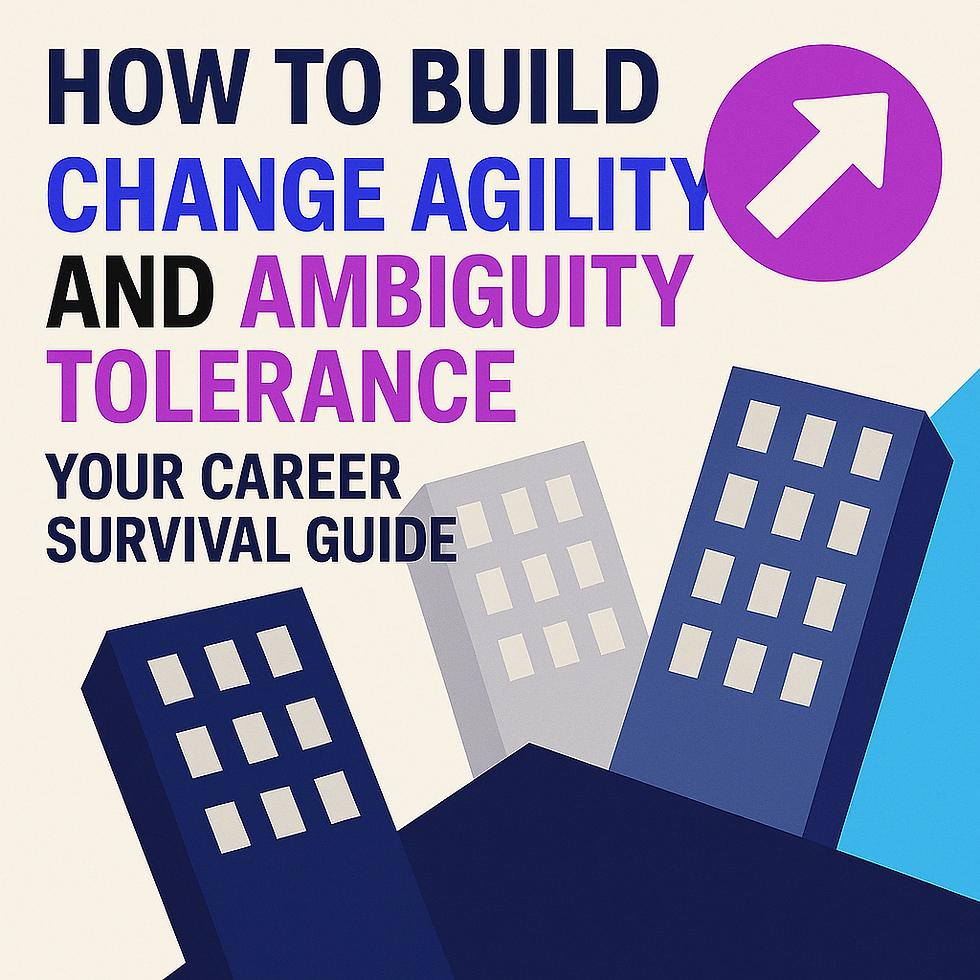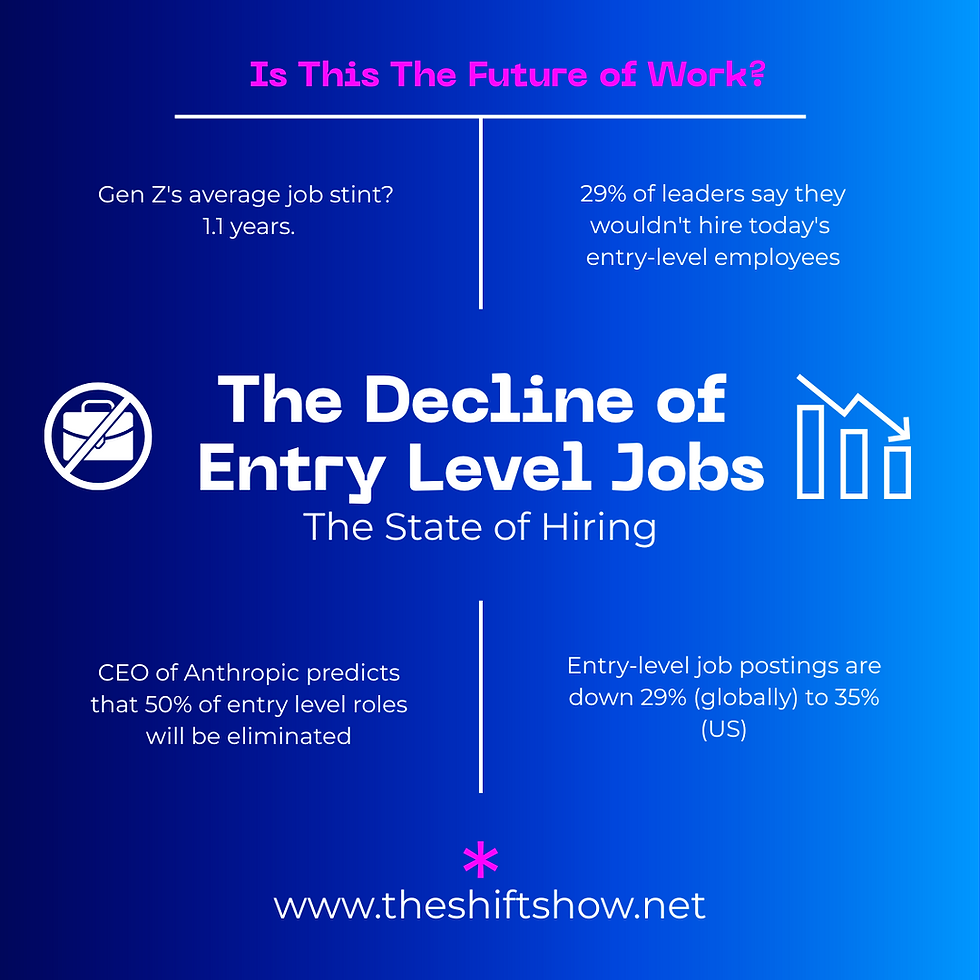Six Ways to Change Your Career Without Starting Over
- Rachel Bourne
- Apr 9, 2025
- 4 min read
Updated: Apr 21, 2025
You’re not starting over—you’re just shifting forward.
Changing careers can feel like standing at the edge of a cliff—uncertain, exhilarating, and a little terrifying. But here’s the truth: You can change your career without starting over. In fact, you probably already have what it takes—you just need a strategy to shift your story, not scrap it.
I started my career as an architect—literally designing buildings and solving physical space problems. Today, I help people design careers and solve workplace challenges as an HR executive and now a podcast host. Was it scary? Absolutely. But every step, every shift, has been a bridge—not a reset. Let me show you how to do the same.
1. Understand Your Transferable Skills (Yes, You Have Them)
When I moved from architecture into HR, I wasn’t “starting over”—I was repackaging. Strategic thinking, system design, stakeholder collaboration, human centered design? These weren’t just architecture skills; they were leadership skills. I just had to learn how to translate them and help others see them.
Start here:
What skills do you use that would be valuable anywhere?
What have people consistently praised you for?
How do you think through problems? That’s a skill, too.
Pro tip: Look at job descriptions in your new field and highlight what you already bring to the table. This is your career bridge—the solid foundation between where you’ve been and where you’re headed.
2. Build a Skill Bridge (And Walk Across It, One Step at a Time)
Career shifts don’t require you to blow up your past—they require you to connect the dots.
When I transitioned into HR, I built a skill bridge from my systems design background to organizational strategy. Now in podcasting, I bridge my HR experience with public storytelling and content creation.
Here’s how to build yours:
Highlight common themes between your past and future
Use the language of your target industry when telling your story
Emphasize universally valued traits like leadership, adaptability, and curiosity
Every pivot I’ve made had one thing in common: I didn’t abandon who I was—I expanded who I could be (and I kept that mindset when I stumbled or was criticized).
3. Use Your Network (It’s Bigger Than You Think)
I would’ve never moved into HR without conversations that started as “curious coffee chats”. When I began thinking about podcasting, I expanded my network, connecting and leaning on people who had done it before.
Do this:
Reconnect with old colleagues or mentors—you never know who might open a door
Attend industry events, panels, or even follow hashtags on LinkedIn
Be honest: “I’m thinking about making a shift—can I learn more about your role?”
Pro tip: Ask for informational conversations, not jobs. People love to share what they know and talk about themselves, and those conversations are often where real opportunities begin.
4. Gain Experience Without Quitting Your Day Job
Freelancing, side gigs, shadowing—these are all ways to try on your new identity without making a leap too soon. I started with project work YEARS before I was in HR full time. Even this podcast started as a side project. And now? It’s one of my favorite ways to serve others.
Try this:
Take a short course to get your feet wet or test tools within your selected industry
Offer your skills pro bono for a nonprofit or friend
Join online communities and challenges in your target space
🎓 Linkedin Learning, Certifications or digital badges can also give you instant credibility—without requiring a new degree.
5. Look Inside Before You Leap
One of the most overlooked strategies? Shifting internally. If you love your company but want to try something new, start there. That’s what I did—moving across departments and domains while building a network of trust. Experienced job hoppers say you should only learn one big new thing in a role so it’s either the company or the career function – if you’re moving to a new career AND a new job, you can still do it but you’re more likely to have some failures and you’ll probably have a ton of time after work learning what you’ll do tomorrow.
Steps you can take:
Ask to shadow someone in a different team who has a job you’re interested in
Volunteer for cross-functional projects that will give you the necessary skills
Let your manager know you’re eager to grow and learn something new
Trust me—many leaders would rather help you stay than lose you to another company.
6. Master Your Mindset: You’re Not Starting Over
This one’s big. Every time I pivoted, there was a voice in my head whispering, “Who do you think you are?” But I’ve learned to listen to a different voice.
It’s the one I first heard in a Teddy Roosevelt quote that changed everything for me (and for Brene Brown, too, which is where I first heard it):

I’ve come back to this quote over and over, especially when I’ve felt judged, unqualified, or scared. It reminds me to stay in the arena. To keep showing up—even messy and uncertain.
And that’s what I want for you, too.
Embrace the beginner’s mindset. Not knowing everything isn’t a flaw—it’s a sign that you’re growing. And honestly? It’s the most exciting place to be. However, too many professionals get hung up on being the smartest person in the room - and that's a lost opportunity for learning, trust building, and growth.
Final Thought: You’re Not Lost, You’re Shifting
Every career change I’ve made—architecture to HR to podcasting—wasn’t about abandoning who I was. It was about honoring where I’d been, and choosing where I wanted to go next.
And guess what? You can do the same.
You’re not starting over, you’re expanding WHO YOU ARE. You’re shifting into something bolder, braver, and more aligned.
So get in the arena. The future of work is already here. Let’s shift into it—together.



Comments